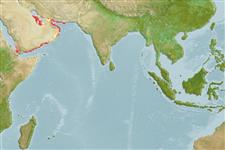>
Ovalentaria/misc (Various families in series Ovalentaria) >
Pseudochromidae (Dottybacks) > Pseudochrominae
Etymology: Pseudochromis: Greek, pseudes = false + Greek, chromis = a fish, perhaps a perch (Ref. 45335).
More on author: Boulenger.
Environment: milieu / climate zone / depth range / distribution range
ນິເວດວິທະຍາ
ສັດທະເລ ກ່ຽວກັນຫີນ; ລະດັບຄວາມເລິກ 0 - 15 m (Ref. 88695). Tropical; 28°N - 12°N, 42°E - 62°E
Western Indian Ocean: from the Makran Coast and Persian Gulf around the Arabian Peninsula to the southern Red Sea and south to Socotra (Ref. 88695). Species occur in two main color forms: with and without the broad, dark brown to dark grey stripe on the side of the body (Ref. 12720).
ຂະໜາດ / ນ້ຳໜັກ / Age
Maturity: Lm ? range ? - ? cm
Max length : 9.0 cm TL ຕົວຜູ້/ບໍ່ມີເພດ; (Ref. 11441)
A cryptic species; collected from tide pools, around boulders, and rock and coral reefs. May sometimes take refuge among spines of large Diadema sea urchins (Ref. 12720). In Socotra Archipelago, it inhabits equally frequently mixed communities of macroalgae and hard corals and sparse hard coral communities on rock platform, including the south and west coast, as well as hard coral communities including those dominated by Acropora, Porites, Galaxea, and encrusting and massive Agariciidae, Pectiniidae, and Mussidae (Ref. 88695).
Life cycle and mating behavior
ການຈະເລີນເຕັມໄວ | ການສືບພັນ | ການວາງໄຂ່ | ໄຂ່ | ຄວາມດົກຂອງໄຂ່ປາ | ຕົວອ່ອນ
Gill, A.C. and J.K.L. Mee, 1993. Notes on dottyback fishes of the genus Pseudochromis of Oman, with description of a new species (Perciformes: Pseudochromidae). Rev. Fr. Aquariol. 20(2):53-60. (Ref. 12720)
IUCN Red List Status (Ref. 130435: Version 2024-1)
Threat to humans
Harmless
Human uses
ການປະມົງ: ທີ່ບໍ່ມີຄວາມສົນໃຈ
ເຄື່ອງມື
Special reports
Download XML
ແຫຼ່ງອີນເຕີເນັດ
Estimates based on models
Preferred temperature (Ref.
123201): 26.2 - 28.8, mean 27.6 °C (based on 129 cells).
Phylogenetic diversity index (Ref.
82804): PD
50 = 0.5000 [Uniqueness, from 0.5 = low to 2.0 = high].
Bayesian length-weight: a=0.00501 (0.00193 - 0.01299), b=3.10 (2.88 - 3.32), in cm total length, based on LWR estimates for this (Sub)family-body shape (Ref.
93245).
ຊັ້ນເຂດຮ້ອນ (Ref.
69278): 3.5 ±0.5 se; based on size and trophs of closest relatives
Fishing Vulnerability (Ref.
59153): Low vulnerability (10 of 100).
